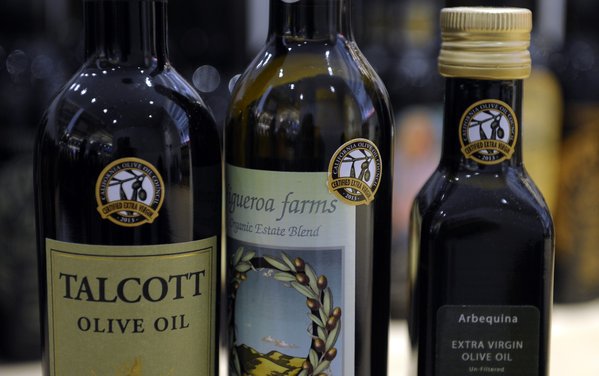U.S. Olive Oil Producers Want Stricter Guidelines For Imports
If you think an olive oil imported from Italy or Spain is superior to one made in California, U.S. olive oil producers would like to have a word with you. They’re looking to change the perception of domestic olive oil, and want you to reach for American-made — in most cases, California-made — at the store.
To level the playing field, U.S. producers are asking the government to place stricter guidelines on imported olive oil, which makes up 97% of the market. They’ve gone as far as holding olive oil tastings for members of Congress.
But it doesn’t seem to be working. The recently passed farm bill excluded a clause that would have allowed for government testing of domestic and imported olive oil to make sure it was labeled correctly. The main concern is foreign producers cutting their extra virgin olive oil with other oils yet still labeling it as extra virgin.
The U.S. Department of Agriculture classifies olive oil as “virgin olive oil, or blends of virgin olive oil and refined olive oil.”
A recent U.S. International Trade Commission report on olive oil outlines how international standards are often unenforced, which can allow for mislabeling. The report highlights the differences in each country’s standards, production, consumption and distribution.
A “national standard of identity” enforced by the government would permit “more aggressive U.S. action,” Eryn Balch, North American Olive Oil Assn. executive vice president, said in a statement. That action would include injunctions and seizures against unscrupulous participants in the olive oil market.
The American Olive Oil Producers Assn. plans to keep putting pressure on the USDA to perform mandatory quality testing for all olive oils.
Are you an import-only olive oil buyer? Let us know in the comments below.
But it doesn’t seem to be working. The recently passed farm bill excluded a clause that would have allowed for government testing of domestic and imported olive oil to make sure it was labeled correctly. The main concern is foreign producers cutting their extra virgin olive oil with other oils yet still labeling it as extra virgin.
The U.S. Department of Agriculture classifies olive oil as “virgin olive oil, or blends of virgin olive oil and refined olive oil.”
A recent U.S. International Trade Commission report on olive oil outlines how international standards are often unenforced, which can allow for mislabeling. The report highlights the differences in each country’s standards, production, consumption and distribution.
A “national standard of identity” enforced by the government would permit “more aggressive U.S. action,” Eryn Balch, North American Olive Oil Assn. executive vice president, said in a statement. That action would include injunctions and seizures against unscrupulous participants in the olive oil market.
The American Olive Oil Producers Assn. plans to keep putting pressure on the USDA to perform mandatory quality testing for all olive oils.
Are you an import-only olive oil buyer? Let us know in the comments below.
SOURCE: LA Times



Leave a Reply
Want to join the discussion?Feel free to contribute!